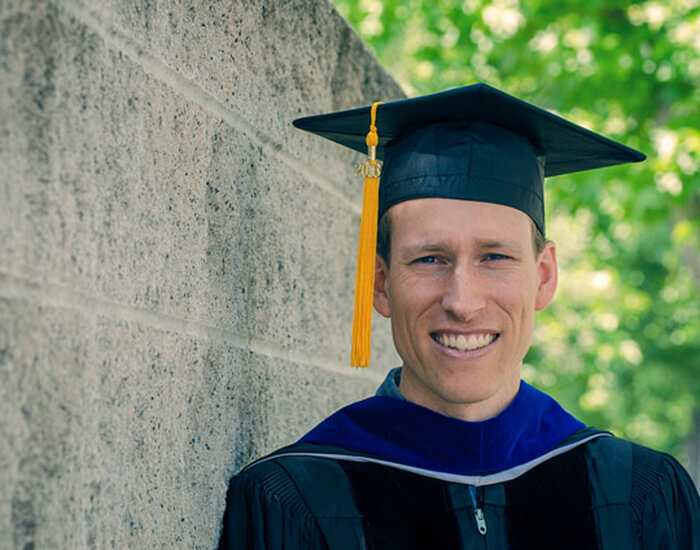It's been a year since Ryan McComb successfully defended his PhD dissertation at KGI in Fall 2016. Since then, he's been working in a prestigious postdoctoral position at Stanford where he is currently studying the mechanisms and factors involved in a specific class of heritable diseases called Tri-nucleotide Repeat Expansion Disorders, a disease class that includes devastating afflictions such as Huntington's Disease.
Ryan graduated from UC San Diego before completing his MBS degree at KGI, focusing his studies on both clinical & regulatory affairs and bioprocessing. Intrigued by KGI's emphasis on both business and science, Ryan knew that KGI would offer him the skills and experience to be able to communicate effectively to industry the practical applications of his background in science.
Says Ryan: "In the business world, you're going to have to be able to communicate with others about the technology-based projects you are working on, and you have to be able to make a profit. You also need to be able to plan your products and convince people that what you are working on is valuable because, in the end, no one is going to care about technology unless you can sell it."
"It is so vital that students understand that, in industry, it doesn't matter if you have a great idea, it only matters if you can complete and work on a project successfully and within budget. This often requires working on a team, working under tight deadlines, and taking direction from cross-functional teams. It's a different mindset; taking business classes will help prepare students for this transition."
After completing his MBS degree, Ryan went on to complete his PhD at KGI, studying vaccines and human therapeutics under research faculty Larry Grill and Mikhail Martchenko Shilman. He finds the people and relationships formed the most memorable part of his experience at KGI. "It is such a good place to build a career network. People from your classes go off and pursue career paths in so many various fields. It is very rewarding to have a network that is so broad across multiple disciplines in the life science field."
"If I were to offer advice to someone who is still in school, I would tell them to take classes that push them outside their comfort zone and teach them how to better understand how other people think. Don't just take elective courses like physics and engineering because, despite offering technical knowledge, they cannot take you much further than the classroom. Supplement your learning with elective classes that are out of the traditional technical suite. Take business classes like economics and accounting because this is where you will learn how to be successful in industry."
Through his postdoctoral work, Ryan hopes to uncover some of the genetic factors that facilitate the expansion of these repeat sequences. After completing this position, Ryan is interested in pursuing a career research for pharmaceutical drug discovery and development.
About the MBS:
KGI's two-year Master of Business and Science program educates highly versatile professionals and future leaders of the life science industries. MBS students develop skills that are vital in today's life science industries, including how to make a compelling presentation, manage a project, lead a team and, equally as important, to work effectively as part of one. They also develop a deep understanding of how the bioscience industry operates-considering the scientific, intellectual property and regulatory issues that dominate the industry.
KGI offers its students many opportunities throughout the program to work with companies in its extensive network of biotech and healthcare companies. These opportunities start in the first year with numerous on-campus networking events and course assignments in which teams of students prepare reports for outside companies. They continue during the summer with internships and culminate in the second year with the capstone Team Master's Project (TMP), in which teams of three to six students work with sponsoring companies in a year-long consulting assignment to solve real problems.
Students enrolled in the Master of Business and Science degree program can choose from among five majors:
- Bioprocessing: This use of living cells is essential to a wide range of industries and lifesaving technologies, from gene therapy vectors and vaccines to the production of renewable biofuels. DNA technology continues to improve, and this concentration prepares students to achieve their own advances.
- Business of Bioscience: Bioscience breakthroughs can only help society if they are successfully developed and marketed. This concentration emphasizes the business acumen and managerial skills necessary to achieve the successful entrepreneurship of technical innovation.
- Clinical & Regulatory Affairs: The marketplace for new medicines and medical devices is increasingly global, so manufacturers must not only meet FDA standards, but also those of government agencies around the world. This concentration illuminates all aspects of the regulatory process, including clinical and non-clinical trials.
- Medical Devices & Diagnostics: New technologies are generating treatments that were unimaginable just a few years ago, and the demand for new devices and diagnostic tools that are affordable and easy to access will only continue to grow. This interdisciplinary concentration prepares students to seize upon the next medical technological advance-or to create it themselves.
- Pharmaceutical Discovery & Development: The quest for the next wonder drug is a key driver of the industry and one of the biggest magnets for investors. This concentration examines the processes of drug discovery and clinical development from the scientific, business, regulatory and ethical points of view.
